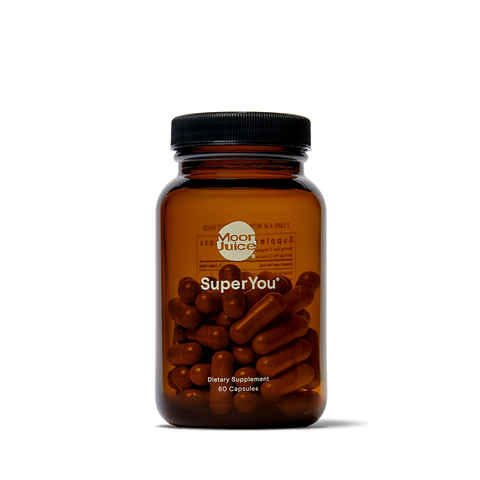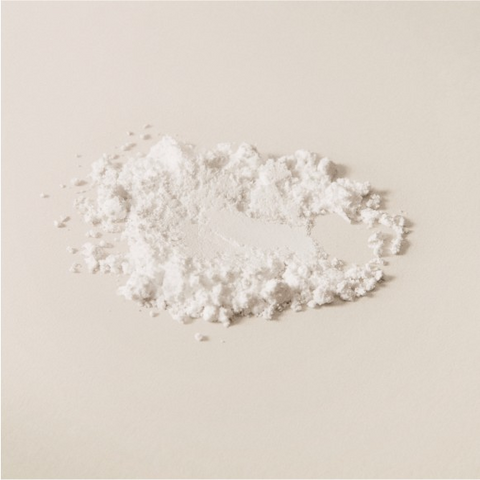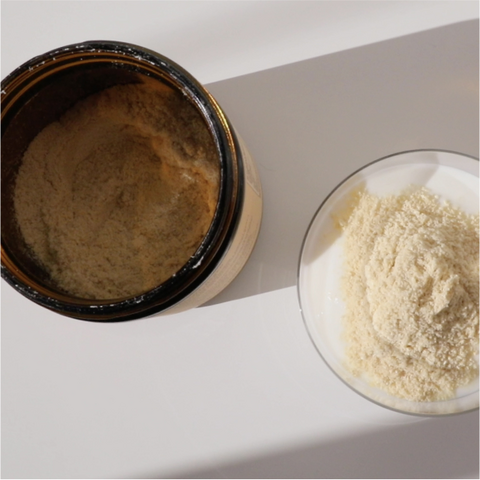If you’ve been feeling low in energy, you’re not alone! Around 60% of U.S. adults report low energy according to a study conducted in 2022. While many factors can contribute to fatigue, nutrition is often the culprit as your body requires certain nutrients in order to function optimally - and when your body is not functioning properly, fatigue is one of the most common symptoms.
One of the nutrients that can make a big difference in your energy levels is Vitamin B12. B12 helps to power a variety of cellular processes within your body — from keeping your muscles mobile to producing new cells and molecules.
B12 supplements are used for a variety of uses — from weight loss to brain health to heightened energy levels. But can B12 give you energy?
Yes! According to recent studies, Vitamin B12 may help you feel more energized—especially if you are deficient in this vitamin to begin.
What Is B12?
Vitamin B12 is one of eight essential B vitamins. Also known as cobalamin, your body uses B12 for many different functions and processes, including:
- Forming red blood cells
- Performing metabolic functions
- Maintaining and regulating nerve function
- Producing new DNA molecules
Most people consume a healthy amount of B12 from their diet, as it occurs naturally in a variety of food sources, including fish, poultry, meat, and dairy. In the United States, many of the packaged foods that don’t naturally include Vitamin B12 are fortified with it in order to boost their nutritional value. This is the case for many breakfast cereals, nutritional yeasts, and non-dairy milk products.
That said, you might be at risk of a Vitamin B12 deficiency due to a variety of medical conditions or lifestyle choices. Medical conditions that impair your body’s ability to absorb Vitamin B12 include:
- Atrophic gastritis
- Celiac disease
- Crohn's disease
- Pernicious anemia
If you’re a vegetarian or vegan, you may also have a difficult time consuming adequate amounts of B12 through foods, since the majority of B12 food sources come from animal products. Additionally, older people may be more likely to experience lower B12 levels.
How B12 Helps Maintain Energy Levels
To fully answer whether or not B12 can give you energy, it’s important to first look at how B12 and energy levels work together.
The current belief among scientists is that B12 likely has a hand in helping your body maintain a healthy energy level, even if it isn’t directly responsible for producing energy. This is thanks to the fact that a lot of the processes it’s involved in can influence your energy levels, like red blood cell formation and cell metabolism.
Here’s what you need to know about how B12 may influence your energy:
#1 May Boost Energy Levels in B12 Deficient People
One way to understand how B12 may help your energy levels is to understand what happens when you don’t have enough of it.
When your body is Vitamin B12 deficient, the earliest signs you might notice are fatigue and weakness. As we discussed, B12 is important in producing the red blood cells that carry oxygen throughout your body. It also supports a healthy metabolism, which is crucial to how your body gets energy from food. When these processes aren’t working optimally, you will likely experience a drop in energy levels.
Studies have found that B12 supplements can help boost energy levels in people with B12 deficiencies. This suggests that making sure your B12 intake remains at healthy levels is essential for healthy living preventing deficiency-related energy slumps.
#2 May Speed Up Metabolism
As we mentioned above, B12 is also important for keeping your metabolism functioning properly. But new research suggests that your B12 level might also play a role in helping your metabolism work even better by increasing your levels of the enzymes that help break down foods. This, in turn, helps your metabolism convert food to energy faster.
More research is needed on this subject, but if B12 can indeed speed up your metabolism, it could help your body become more efficient at:
- Producing energy
- Using energy
- Storing energy
The more efficiently your body can produce, use, and store energy, the more energized you will feel.
#3 May Improve Your Mood
Another indirect way B12 could benefit your energy levels is by improving your mood. According to a study from 2013, Vitamin B12, along with prescribed antidepressants, was effective in lessening the symptoms of common mood disorders.
B12 is thought to affect your mood by increasing your brain’s levels of the mood-regulating chemical, serotonin. When your serotonin levels drop, your mood tends to drop too. When your mood remains low, it can impact your energy levels and result in:
- Sleeplessness
- Physical fatigue
- Mental fatigue
In other words, keeping your B12 absorption or intake at a healthy level may help keep you in good spirits, preventing any fatigue that often results from low moods.
#4 May Boost Energy Through Blood Cell Development
One of the most important functions of Vitamin B12 is to help your body develop and maintain red blood cells, which directly impact how your body produces and uses energy.
Red blood cells perform two important roles:
- They carry carbon monoxide to the lungs to be exhaled, and
- They oxygenate tissue all through the body.
By carrying oxygen throughout your body, red blood cells infuse your muscles with the energy they need to maintain strength and function properly. Without red blood cells, your body wouldn’t be able to distribute the energy it makes from food to all the parts of your body that need it.
Becoming deficient in red blood cells can lead to other serious health conditions. Conditions associated with imbalanced red blood cell levels include:
- Anemia
- Certain cancers
- Congenital heart disease
- Hypoxia (low blood oxygen levels)
Sign Up, Nerd Out
Get wellness tips, education, and recipes
delivered straight to your inbox.
Get wellness tips, education,
and recipes delivered
straight to your inbox.
B12 Additional Benefits
B12 supplements have been linked to many health benefits beyond boosting your energy, especially in people with lower-than-normal levels. This may make taking Vitamin B12 dietary supplements worthwhile even if increased energy isn’t your main goal.
The top potential benefits of B12 supplements include:
- May help prevent anemia – Anemia is a blood condition characterized by a lack of red blood cells, which reduces the delivery of oxygen to your body. Because you need enough B12 to build new red blood cells, supplements could be useful for reducing anemia risk.
- May help prevent birth defects – If you’re pregnant, maintaining sufficient B12 levels may be especially important. A 2014 study suggests that maintaining adequate B12 levels could be useful in reducing the risk of birth defects by at least three times.
- May boost bone health – Several studies suggest a link between bone health and B12 supplements. A 2005 study found that lower-than-average bone density is common among people with B12 deficiency. Other studies link B12 deficiency to bone loss and osteoporosis in older women. Vitamin B12 could provide essential support for healthy bones, particularly as you grow older.
Are Vitamin B12 Supplements Safe?
Vitamin B12 supplementation is considered safe as long as you don’t take more than the recommended daily dose. For adults, that’s 2.4 micrograms per day.
A slightly higher dose of B12 is generally nothing to worry about as your body usually absorbs only as much B12 as it needs. Because B12 is water-soluble, anything beyond what your body needs is easily expelled through urine. There are various ways people get this supplementation, but the most common are Vitamin B12 capsules, gummies, shots, and B12 injections.
Certain side effects can occur if your Vitamin B12 levels become too elevated. These side effects may include:
- Diarrhea
- Fatigue
- Headache
- Tingling in extremities
- General weakness
Signs and Symptoms of B12 Deficiency
As mentioned above, most people are able to maintain a healthy B12 level based strictly on diet. But it’s still possible for your B12 levels to be insufficient, even if you don’t have a diagnosed vitamin deficiency.
Symptoms of a B12 deficiency can include:
- Excessive tiredness or weakness
- A loss of appetite
- Unexpected weight loss
- Digestive problems and nausea
Symptom onset may be sudden or progress gradually. Other, more serious symptoms may also include:
- Cognitive impairment
- Impaired mobility
- Numbness or tingling in extremities
- Tongue swelling, and inflammation
Ways to Increase Your B12 Intake for More Energy
While our bodies don't produce this vital vitamin naturally, there are two primary ways to ensure we get the required amount: dietary supplements and the foods we consume. Both supplements and certain foods offer effective avenues to boost our B12 levels, catering to various dietary preferences and needs.
Vitamin B12 Supplement
If you’ve been feeling sluggish or worn down lately, a Vitamin B12 dietary supplement may be able to help boost your energy. The importance of Vitamin B12 in processes like your body’s metabolism and red blood cell production suggests that it plays a key role in keeping your systems functioning smoothly.
When it comes to boosting energy levels, a Vitamin B12 supplement may be most beneficial for people who are deficient. Still, the evidence suggests that even if you aren’t deficient, supplementing with B12 can make a big impact on other parts of your health, including mood, mental health, and metabolism.
Ting™ is our daily B Vitamin supplement with B Complex, Methylated B12, and adaptogenic Ginseng to give your body the nutrients it needs for healthy energy, metabolism, and mood. Take ½ a teaspoon with water for a delicious energy drink alternative. Tastes like yummy mango!
Foods High in B12
- Natural Sources: While supplements are a popular way to increase B12 intake, the vitamin is also naturally present in various foods. Animal products like fish, meat, poultry, eggs, milk, and milk products are rich in B12.
- Fortified Foods: For vegetarians or vegans who might not get enough B12 from animal products, many plant-based foods are fortified with the vitamin. This includes certain cereals, plant-based milk alternatives, and meat substitutes.
In conclusion, Vitamin B12 plays a pivotal role in our body's energy production and overall well-being. While it's clear that a deficiency can lead to fatigue and other health issues, even those with adequate levels may benefit from increased B12 intake. Whether through supplementation or dietary choices, ensuring optimal B12 levels can be a key factor in maintaining energy and vitality.
Sources:
Safety and Health Magazine. Exhausted nation: Americans more tired than ever, survey finds.
Mayo Clinic. Vitamin B12.
Cleveland Clinic. Vitamin B12 Benefits and Sources.
National Institutes of Health. Vitamin B12.
Cleveland Clinic. Can B12 Shots Boost My Energy and Help Me Lose Weight?
Harvard Health Publishing. Vitamin 12 deficiency can be sneaky and harmful.
PubMed.B Vitamins Can Reduce Body Weight Gain by Increasing Metabolism-related Enzyme Activities in Rats Fed on a High-Fat Diet.
National Library of Medicine. Obsessive Compulsive Disorder as Early Manifestation of B12 Deficiency.
National Library of Medicine. Vitamin B12 Supplementation in Treating Major Depressive Disorder: A Randomized Controlled Trial.
Cleveland Clinic.Function of Red Blood Cells.
Mayo Clinic. Anemia – Symptoms and Causes.
National Library of Medicine. Maternal Vitamin B12 Status and Risk of Neural Tube Defects in a Population With High Neural Tube Defect Prevalence and No Folic Acid Fortification.
National Library of Medicine. Low plasma Vitamin B12 is associated with lower BMD: the Framingham Osteoporosis Study.
PubMed.Low serum vitamin B-12 levels are associated with increased hip bone loss in older women: a prospective study.
PubMed.The relationship of homocyteine, B12 and folic acid with the bone mineral density of the femur and lumbar spine in Turkish postmenopausal women.

.jpg?v=1757541451041)















